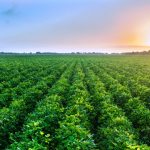A Brief Guide to the Impacts of Climate Change on Food Production

(IPS) – Food may be a universal language – but in these record-breaking hot days, so too is climate change. With July clocking in as the hottest month on Earth in recorded history and extreme weather ramping up globally, farmers are facing the brunt of climate change in croplands and pastures around the world.
Here in the U.S., for instance, climate impacts like more downpours make it harder to avert flooding and erosion on farms across the Midwest. California farmers, on the other hand, must find ways to stay productive despite increasing drought and wildfire risks.
It all amounts to far more than anecdotal inconvenience: The Intergovernmental Panel on Climate Change’s Fourth National Climate Assessment report projects that warming temperatures, severe heat, drought, wildfire, and major storms will “increasingly disrupt agricultural productivity,” threatening not only farmers’ livelihoods but also food security, quality, and price stability.
If these anticipated effects sound extreme, so too are the causes.
Five climate impacts affecting food production now
Climate change poses not just one but a whole slew of challenges to farmers – and to the larger communities that depend on them for food. From erratic precipitation to changing seasons, consider just these five key climatic changes and how they stand to affect food availability now and in the future:
1) More extreme weather can harm livestock and crops. Major storms have always devastated farms, whether from damaging winds during a storm, or erosion and landslides that can rear up even as the storm subsides. But now they’re becoming even more common. In spring 2018, for example, unusually heavy rain and snow storms caused massive flooding across the U.S. Midwest, leaving some areas 10 feet deep in sand. In Nebraska alone, farmers lost an estimated $440 million of cattle. As a result of these flooding conditions, many farmers had to delay spring planting. Delays in commodity crops like corn and soybeans aren’t just stressful for farmers, either – they could lead to food price volatility and even potential food insecurity.
Read more at: InterPress Service
Source: CARICOM TODAY

 Previous Post
Previous Post Next Post
Next Post